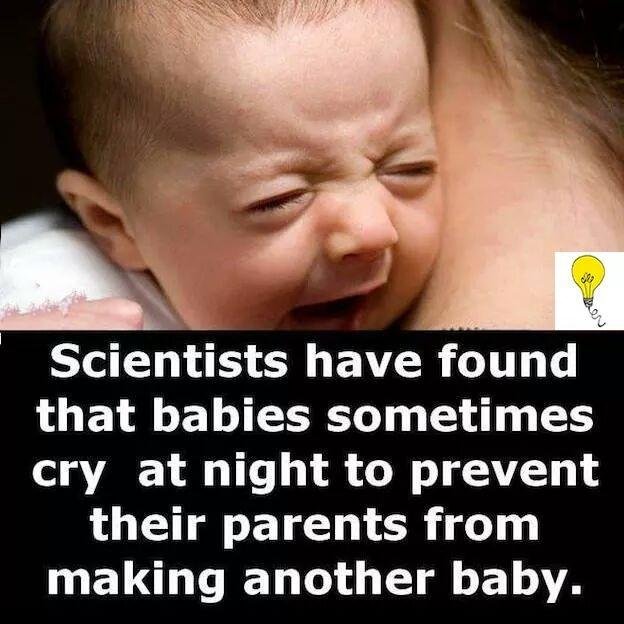Babies cries at night to prevent siblings

When a baby cries at night, exhausted parents scramble to figure out why. He’s hungry. Wet. Cold. Lonely. But now, a Harvard scientist offers more sinister explanation: The baby who demands to be breastfed in the middle of the night is preventing his mom from getting pregnant again.
This devious intention makes perfect sense, says evolutionary biologist David Haig, who describes his idea in Evolution, Medicine and Public Health. Another baby means having to share mom and dad, so babies are programmed to do all they can to thwart the meeting of sperm and egg, the theory goes.
Since babies can’t force birth control pills on their mothers, they work with what they’ve got: Nighttime nursing liaisons keep women from other sorts of liaisons that might lead to another child. And beyond libido-killing interruptions and extreme fatigue, frequent night nursing also delays fertility in nursing women. Infant suckling can lead to hormone changes that put the kibosh on ovulation (though not reliably enough to be a fail-safe birth control method, as many gynecologists caution).
Of course, babies don’t have the wherewithal to be interrupting their mothers’ fertility intentionally. It’s just that in our past, babies who cried to be nursed at night had a survival edge, Haig proposes.
The timing of night crying seems particularly damning, Haig says. Breastfed babies seem to ramp up their nighttime demands around 6 months of age and then slowly improve — precisely the time when a baby would want to double down on its birth control efforts.
Genetic disorders that are inherited from mothers or fathers provide even more evidence. Babies who get certain genes from their mothers sleep longer in the night, which is in the best interests of a woman who wants to get pregnant again. But babies who get the same genes from their fathers wake up more often, delaying ovulation in their mothers, Haig writes. That makes evolutionary sense: Because fathers have no guarantee that the next baby will also be his, they (men and their genes) are presumably not interested in ovulation starting again.
Haig’s work builds on a similar proposal published in 1987, and if it’s right, it means that breast-fed babies who cry at night might be showing the ultimate sibling rivalry. Unsurprisingly, Haig has received a lot of interest on his theory, from the general public (he just appeared on Fox News) and from other scientists, who wrote responses to his work in the same journal.
In his comment, anthropologist James McKenna of the University of Notre Dame points out that infants may have evolved to wake up at night for all sorts of other good reasons. Babies can get too hot, or hungry, or they could just want a cuddle from mom. And babies aren’t always to blame for rousing: In one study, McKenna and colleagues found that 40 percent of babies’ night wakings were actually caused by mothers rustling around nearby. These wakings could easily have benefits for the baby that trump the birth control for mom, McKenna writes: Frequent wakings prevent the baby from slipping into too deep a sleep, which can be dangerous.
But if Haig is right, the little screamers are doing all they can to prevent another baby from coming along and ruining their good thing. That self-interest is in direct conflict with the mother’s evolutionary goal, which is to shove her genes into as many children as possible. These divergent goals, Haig says, are an overlooked part of child-parent relationships. “Mothers have evolved to maximize their numbers of surviving children, which is different from maximizing the survival of each individual child,” he says.
There’s no way to go back and test whether night nursing actually helped babies survive in the early chapters of our evolutionary history. Today’s babies are growing up in a world that doesn’t look much like the one in which this trick could have been useful. “I think that it’s an adaptation for a world very different from the current world,” Haig says. Contraception, solid nutrition and good health care have probably removed modern babies’ drive to prevent another sibling.
Although we’ll never know exactly why babies evolved to cry at night, Haig’s idea offers one interesting explanation. Whether he is right or not, there is another message lurking in this study, and it’s a message for modern parents: Babies who don’t breastfeed during the night and babies who take bottles don’t wake up as much during the night — and they don’t seem to be worse off for it, Haig says. That result implies that nursing throughout the night isn’t necessary. So moms shouldn’t beat themselves up if they don’t always heed the nighttime calls to breastfeed, Haig says.
“There’s a tendency to think of infants as incredibly fragile beings, and if you do just one thing wrong, they’re ruined for life,” Haig says. “That to me doesn’t make any evolutionary sense. They should be fairly robust and handle all sorts of variation in sleeping arrangements and feeding arrangements.”
He wraps up our interview with a sentiment that I think all parents embrace: “Do what feels right for yourself.”
This post was promoted with @monitorcap traffic bot & STEEM promotion service.
Send MIN. $1 SBD to @monitorcap bot with your link in MEMO field
and recieve upvotes & resteems for your posts. @monitorcap - where 'seen' matters !